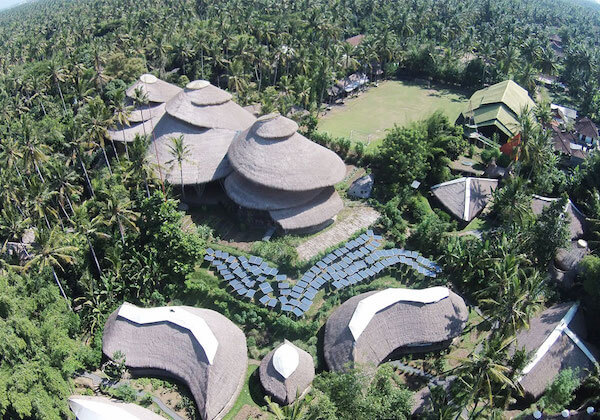Education and Climate Action - Which International Schools are Making a Difference?
- By Juliet Ryder
- Posted 10 October, 2019

As a very memorable Climate Week drew to a close we saw millions of young people from more than 185 countries unite in protest to demand that governments take action to safeguard their futures. This year the youth movement, inspired by 16 year old Greta Thunberg from Sweden, joined together to take part in the biggest climate protest in history.
The Importance of Environmental Education
At the first United Nations Conference on Environment and Development in Rio de Janeiro, Brazil in 1992, education was recognised as an essential element to generate awareness and cultivate understanding on issues prevalent to our Earth.
Many well known environmental experts also believe that Environmental Education is very important for young people today.
Jane Goodall often talks about the importance of young people in relation to the improvement of our environment and famously said “Young people, when informed and empowered, when they realise that what they do truly makes a difference, can indeed change the world”.
Sir David Attenborough is also a great believer in Environmental Education and is known for saying “The great heroes and heroines of our society are of course the teachers. Once a child has been shown what the natural world is, it will live with them forever”.
We choose to build a better world through a more relevant school. For our kids, with our kids. Not because it's easy, but because it's hard.
The Founders of REAL School Budapest
The Benefits of Environmental Education
Environmental education has, however, been proven to have many other benefits in addition to improving students’ environmental knowledge. Stanford University, in conjunction with the North American Association for Environmental Education, provide an interesting summary of their research findings showing that improving environmental knowledge is just the tip of the iceberg in terms of the benefits to students.
The Green Schools Alliance say that research shows when compared with conventional schools, green schools have 87% less absenteeism, find it 74% easier to attract and retain teachers and have a 72% better image within their community.
There are other direct benefits too, such as improvements to the overall school environment and to the health and wellbeing of the teachers and the children. Greenacre International School in Thailand explain that as our society continues to advance technologically, children are staying indoors more instead of engaging with the natural environment. Their environmental programme includes the use of school gardens as outdoor classrooms to help students to reconnect with the natural world and to help with the teaching of concepts and skills across a range of subjects including maths, science, art and health. As more and more young people around the world take an active interest in environmental issues we are seeing more schools recognising the importance of environmental education for their students.
International Green Schools
Perhaps the best known, and one of the most impressive of all the sustainable education projects is The Green School, Bali. The incredible architecture of the Green School rises majestically out of the Indonesian jungle and is built entirely using bamboo and other sustainable materials. Green School students proudly generate their own power, recycle their waste, learn about sustainable farming and have a school bus that runs on used cooking oil. Two further Green Schools are due to open their doors to students in New Zealand (2020) and South Africa (2021).
There are many other schools around the world that have been developed with Environmental Education at the heart of their philosophy. Life School in Guatemala, Cuixmala in Mexico and Cloud Forest in Costa Rica all have their roots firmly embedded in environmentalism and sustainability on a local, national and international scale. Like Green School, they believe strongly in offering scholarships or heavily discounted rates to local children and building excellent relationships and partnerships with the local community.
Many of these schools are a little off the beaten track for most families on the international schools circuit to be able consider. There are, however, other options when you are searching for a school with a sustainable ethos. In total we have catalogued more than 60 schools in cities all over the world that have made a strong commitment to Environmental Education.
REAL School Budapest is an impressive new school, inspired by Green School, Bali, that has developed the ideas of Green School in an urban and European cultural setting. The project came out of the personal frustration of the founding family who moved to Bali for a different school experience. Their experience at in Bali completely and unexpectedly changed their lives, so over four years, with the help of a professional crew from Green School and beyond, they carefully worked out the details of the Green School they felt they must set up back in their homeland. The founders of REAL School summed this up when they said "We choose to build a better world through a more relevant school. For our kids, with our kids. Not because it's easy, but because it's hard."
Eco-Schools International Schools Programme
The Eco-Schools Programme is a project set up by the Foundation for Environmental Education (FEE), the organisation behind the prestigious Blue Flag awards for clean beaches, is the largest global sustainable schools programme in the world. Following sign up, schools need to demonstrate that they have put in place various steps from the framework in order to attain the coveted awards and the prestigious Green Flag. There are currently 42 International schools from 24 different countries registered with the Eco-Schools Programme.
Nicole Andreou, International Eco-Schools Coordinator explains “Eco-Schools is Education for Sustainable Development in action. It provides every child with opportunities to acquire the knowledge, skills, attitudes and values necessary to live sustainably and be able to influence others. Students, teachers, parents and management come together to realise real-life positive actions that come about as a result of a deep learning process, and that provide climate change solutions”.
Sustainability Pledges
Many of the more mainstream but holistically minded international schools or groups of schools such as the ten Dulwich College International group schools, share a sustainability ethos and actively implement initiatives on campus. They also take this into accuont in terms of design and development and reducing resource use for example, and in their local communities by becoming involved in local environmental activities, sharing environmental knowledge with local schools and engaging with the environment on their Eco Explorer Camps.
The Schools
Below are the schools around the world that we have found who share a commitment to sustainability. If you think your school should be in this list, please add your school to our site if it isn't on here. If your school is already listed on our site, make sure you claim it and contact us via your dashboard or via our contact us page.
Over the coming months and years we plan to add more individual detail to the report and dig into how far each school takes its commitments. We recognise that some schools are almost entirely eco focused while others have sustainability as a significant part of a wider curriculum, something we will aim to show next to each school.
Please share and help encourage more schools to get involved!
|
|
Location |
Curriculum |
Rating |
|
Indonesia |
|
|
|
|
Ubud |
English |
4.80 |
|
|
Jakarta |
English |
4.00 |
|
|
Jakarta |
English |
4.50 |
|
|
South Tangerang |
English |
5.00 |
|
|
Hungary |
|
|
|
|
Budapest |
English |
5.00 |
|
|
Budapest |
English |
5.00 |
|
|
Spain |
|
|
|
|
Marbella |
English |
5.00 |
|
|
Barcelona |
English |
5.00 |
|
|
Cadiz |
English, Spanish, French |
4.25 |
|
|
Thailand |
|
|
|
|
Chiang Mai |
English, Thai |
4.20 |
|
|
Ao Luk |
English |
4.00 |
|
|
Koh Samui |
English |
5.00 |
|
|
Malaysia |
|
|
|
|
Kuala Lumpur |
English |
5.00 |
|
|
Kuala Lumpur |
English, Islamic |
5.00 |
|
|
Costa Rica |
|
|
|
|
San Jose |
English, Spanish |
5.00 |
|
|
Taiwan |
|
|
|
|
Taipei |
English |
5.00 |
|
|
Mexico |
|
|
|
|
Bucerias |
English, Spanish |
n/a |
|
|
Bucerias |
English, Spanish |
4.00 |
|
|
Cancun |
English |
n/a |
|
|
Argentina |
|
|
|
|
Buenos Aires |
English |
2.00 |
|
|
Buenos Aires |
English |
3.80 |
|
|
Brunei |
|
|
|
|
Bandar Seri Begawan |
English |
5.00 |
|
|
Bandar Seri Begawan |
English |
4.60 |
|
|
Seria |
English |
5.00 |
|
|
Chile |
|
|
|
|
Antofagasta |
English |
4.25 |
|
|
Myanmar |
|
|
|
|
Yangon |
English |
4.20 |
|
|
Yangon |
English |
4.80 |
|
|
Yangon |
English |
5.00 |
|
|
Yangon |
English |
4.20 |
|
|
China |
|
|
|
|
Beijing |
English |
4.25 |
|
|
Shanghai |
English, Chinese |
n/a |
|
|
Suzhou |
English |
3.60 |
|
|
Suzhou |
English |
n/a |
|
|
Zhuhai |
English |
n/a |
|
|
Kazakhstan |
|
|
|
|
Astana |
English |
5.00 |
|
|
Almaty |
English |
3.40 |
|
|
Colombia |
|
|
|
|
Bogota |
English |
5.00 |
|
|
Cali |
English |
5.00 |
|
|
Egypt |
|
|
|
|
Cairo |
English |
3.75 |
|
|
Georgia |
|
|
|
|
Tbilisi |
English |
4.8 |
|
|
Bahrain |
|
|
|
|
Hamala |
English |
4.00 |
|
|
Manama |
English |
3.80 |
|
|
Nepal |
|
|
|
|
Kathmandu |
English |
4.20 |
|
|
Kathmandu |
English |
4.60 |
|
|
Panama |
|
|
|
|
Panama City |
English |
4.50 |
|
|
Panama City |
English |
5.00 |
|
|
Cambodia |
|
|
|
|
Phnom Penh |
English |
5.00 |
|
|
Phnom Penh |
French |
4.80 |
|
|
Saudi Arabia |
|
|
|
|
Riyadh |
English |
4.00 |
|
|
Riyadh |
English |
4.33 |
|
|
Jeddah |
English |
4.60 |
|
|
Vietnam |
|
|
|
|
Hanoi |
English |
5.00 |
|
|
Quang Nam |
English |
5.00 |
|
|
Kuwait |
|
|
|
|
Safat |
English |
4.40 |
|
|
Salwa |
English |
4.25 |
|
|
Tajikistan |
|
|
|
|
Dushanbe |
English |
4.00 |
|
|
Uruguay |
|
|
|
|
Montevideo |
English |
5.00 |
|
|
Oman |
|
|
|
|
Muscat |
English |
5.00 |
|
|
India |
|
|
|
|
New Delhi |
English |
5.00 |
|
|
Guatemala |
|
|
|
|
Panajachel |
English |
5.00 |
|
|
Namibia |
|
|
|
|
Swakopmund |
English |
4.00 |
|
|
Canada |
|
|
|
|
Vancouver |
French |
4.00 |
|
|
Austria |
|
|
|
|
Vienna |
English |
4.75 |
|
|
Laos |
|
|
|
|
Vientiane |
English |
5.00 |
